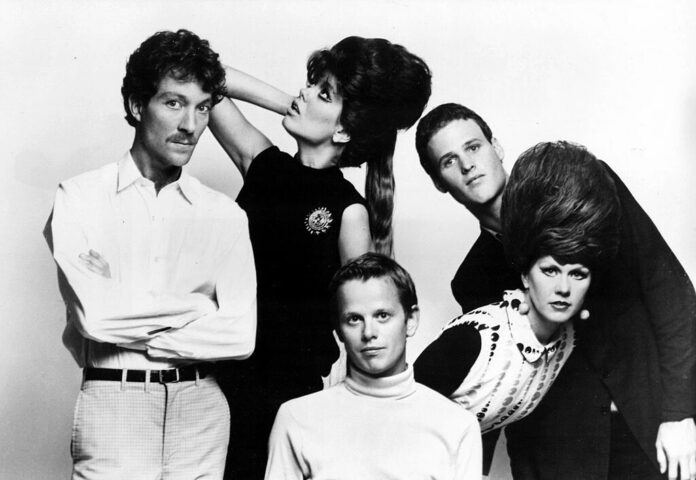It was Detroit house godfather DJ Theo Parrish who told me to go buy the B-52’s Mesopotamia, the six-song 1982 EP produced by David Byrne. The recommendation definitely did not come from any of the old guard, white Rolling Stone rock critics to which we were all subjected back in the olden times, and not from Nelson George or Greg Tate at the Village Voice (two of the few Black voices covering music for the titan of all independent weekly newspapers back in the day). Not even Pitchfork, which has given us long reads on albums from the past with its vaunted Sunday reviews for the last couple of years. Sometimes they right, other times, they ugh.
Nope, none of them.
Theo (freaking) Parrish, soul controller behind the decks, and extreme record producer, father of the groundbreaking Ugly Edits (praise Black Jesus). The artist who introduces needle skips when spinning that vinyl for six-plus hours, to let you know there is a human—not a robot—at the controls. His NTS mixes and IRT DJ gigs in Brooklyn, Berlin, or London are the kinds that have people writing down playlists on toilet paper. Everybody there knows they are in for a ride. Disco, techno, hip hop, house, new wave, rock, jazz, dub, fusion, Brazilian—it all plays on his floor.
Yep, that guy. And I still wasn’t ready when I bought the sucker.
Sometime in the late 2000s, I was getting ready to hit club Mighty (now known as The Great Northern) to see Theo put it on folk. Excuse me, perform. He happened to be outside, looking at what shoes the ladies were wearing. (If they trainers aka sneakers, that means folks came ready to dance—it’s an old Duke Ellington observation that still works.) We chopped it up. I was talking about how I was digging in on post-punk, no-wave, disco-not-disco tracks, and before I knew it, he interjected (unlike me, he had a set to play that night.) “Hey, brotherman, Doctor Talky McTalky. Go to your local thrift store, and dig through the rock section for Mesopotamia by the B-52s. It’s produced by David Byrne. It will set you back no more than two bucks, and will become priceless in your DJ sets.”
Word. Bet.
The next day, I went down the street to Community Thrift on Valencia. Arrived at 8:59am, perused the rock section, passed over five million copies of Boz Scaggs’ Silk Degrees (subject of a 2021 Pitchfork Sunday review, I may add), found Mesopotamia, and it cost me a buck seventy-five. Paid for it, swung by Blue Bottle for some pricey High Octane and croissant, went home, threw that bad boy on the turntable.
And was blown away.
It’s funny how things come full circle, right? Talking Heads recently got a proper send-off with the newly restored Stop Making Sense music documentary celebrating its 40th anniversary. The band members seemed to be getting along and genuinely laughing with each other in the film. That’s kinda crazy, right?
Meanwhile, the B-52s are themselves slowing down and preparing for semi-retirement, getting well-deserved recognition from everybody, deservedly so, for being a quintet of mostly gay, party-loving, college-town dropouts who changed the musical landscape. They conquered the world with their unique post-punk clash rule-breaking take on the genre. In a heavily Reaganesque ’80s world, they fearlessly forged on. Embraced their own joyous and authentic selves, and have remained just as courageous 40-plus years later.
I mean I love REM too, but if I had a choice to see one of those iconic Athens, Georgia bands—I mean, is it even close? Nope.
I was familiar with the B-52’s schtick back in the day. “Rock Lobster” is a timeless jam that always gets people dancing and excited. Dropping down on the floor, sizzling like bacon. However, once “Love Shack” became mainstream, MTV slurped the bejesus out of it. It played like, every hour.
I had to find something else, for a time.
Right from the beginning of their career, the B-52 embraced alien stories, punk attitude, and camp culture, creating a unique and energetic synthesis of high and low art that always remained fun. No one else could replicate it. One of my deep crate faves was always “Legal Tender,” whose synths—swoon. Just mesmerizing, perfectly complemented by handclaps and vocals that weaved in and out, about the guitar accents. Just a meticulously crafted sound collage.
Then, Mesopotamia broke my brain.
Listen, the core B-52 stans were not very happy with that record at the time of its release. Many thought Byrne did a Talking Heads record with B-52’s as the default band to carry out his desires. And they might be right.
At the time, Byrne was working on a musical score for The Catherine Wheel, a Twyla Tharp dance production. He was forced to deliver long work days, collaborating on the Tharp project during the day and hitting the studio with The B-52s at night.
According to Rodger Lyle Brown’s book Party Out of Bounds: The B-52’s, R.E.M., and the Kids Who Rocked Athens, Georgia, he found the party band was weary, exhausted, and lacking in creativity. More importantly, they were tired of being solely known as a party band.
“In 1980, we’d done like nine months of touring, and we were overwhelmed, overworked, just kind of worn out with the whole thing,” said drummer Keith Strickland in the book. “We were ready for a rest. It had really become work, and the fun and spontaneity of it was gone—definitely gone.”
Also at a crossroads of sorts, Byrne was coming off the critical and commercial success of Remain in Light with Talking Heads. All the same, the B-52’s were kinda over it. Their new direction would have to be molded like clay, so Byrne moved them in the direction of minimalism, nearly a decade ahead of the now-tiresome term “minimal techno.” He went heavy on the rhythm, brought in synths, turned down the kooky, and kicked up the cold wave grooviness. They made a record that was not well-received by all upon its release.
When it dropped on January 27, 1982, the EP charted on the Billboard 200 in the United States, with the title track receiving a big push from the pioneering Detroit DJ The Electrifying Mojo.
A lodestar influence on Black radio all over the country in the ’70s and early ’80s, The Electrifying Mojo made records appear on the Black Billboard charts. He was one of the few, very few, people who could actually land a Prince interview. This sci-fi intellectual presence, who followed an all-styles ethos when it came to his playlists, is credited with heavily influencing the first wave of Detroit techno producers.
Electrifying, Mojo championing and co-signing on the B-52s, is monumental. He regularly played “Mesopotamia,” and even hosted the band on his show.

“We never pitched our music to any specific audience,” says Fred Schneider, frontman of the B-52’s in a Red Bull Music Academy feature on the influential Detroit DJ. “The fact that Mojo [played our music on a Black station]… our manager didn’t like the idea, but we didn’t care what he thought. We just wanted to reach whoever wanted to party and have a good time and liked our music, and Mojo liked it.”
Of course, Mojo AND Black radio loved it. It was infused with a blend of that little bit of everything sauce, located at the spot where rock and dance clashed, melded, fought, fucked, slow-danced, and shared an early morning bagel. Same groove as “Voices Inside My Head” by Common Sense and the early stripped-down dance rock versions of Gary Numan (apart from his popular radio hit “Cars” with its coldwave thump).
“Mesopotamia” can serve to mark a transitional move into techno in a DJ set, or a shift from electronic to other modal forms of dance music. The interplay between Schnieders and Cindy Wilson’s voices, along with the track’s animated and authoritative delivery, moves nicely on a rhythm reminiscent of David Byrne’s nervous fonk, and shimmering guitar tones. It’s a masterclass in otherness, the stuff bringing heads to the party.
Singer-instrumentalist for the B-52’s Kate Pierson recalled a 1982 disagreement with the band’s manager in which he convinced them not to appear on New York’s WBLS, the largest Black-owned radio station in the country, to promote the album. He believed it would be “confusing” for their core audience.
In retrospect, it seems it’s the band manager who was confused.
Guess who was not? Theo Parrish.







